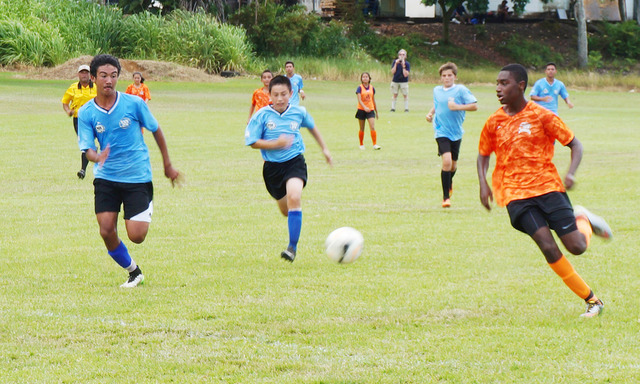Each and every one of us who has had their sons and/or daughters play youth sports knows exactly what is meant when hearing the phrase, “Little League Parents Syndrome.” ADVERTISING Each and every one of us who has had their
Each and every one of us who has had their sons and/or daughters play youth sports knows exactly what is meant when hearing the phrase, “Little League Parents Syndrome.”
It’s the cringe-inducing parent at the game, or sometimes at practice, yelling personal advice to the youngster, drawing the attention from all around, distracting the player, distorting what should be taking place when keiki play sports.
Parents, at least most of them, want to help, want to provide encouragement and enthusiasm but too often, it seems, they do it in all the wrong ways.
“I’ve done this for a long time,” said Mason Souza, county administrator of parks and recreation, last week at a youth basketball camp in Hilo, “I’ve heard it all, but I have to say, I think these parents want to do the right thing for their kids.
“They think they are helping,” he said, “but there’s a time and place for everything; the simple thing is that the job of parents is to encourage and support their children and everyone on those teams, it’s the coach’s job to coach.”
Time and place, indeed. This is the time to send a message to every parent with keiki in some form of team athletics competition. Registration for some youth soccer clubs is on this week, Hilo High School recently had a preseason parents meeting for football, school is opening in soon.
Yes, it’s time for the young ones to get ready, but it’s also time for parents to reconsider the new seasons with a broader, possibly more informed view of their role.
Bruce Brown is a professional in this regard. He runs Proactive Coaching, a national organization that works with athletes, parents and coaches to generate a healthier approach to sports and how we all fit in.
He has “a really large following” in Hawaii, he said in a phone interview last week from his Camano Island home in Washington State, and has worked with everyone from 6-year-olds to the Philadelphia Eagles.
He knows of what he speaks.
“If you could only share one bit of advice with a parent,” Brown said, “it would be to convince them to take about five minutes sometime before the first registration or practice or whatever. Have two sheets of paper, give one to your kid, and keep one for yourself. Then say, ‘Write down the top three reasons you want to play soccer,’ or basketball or whatever it is,” he said.
“This is how you speed up the learning curve. Our work in this area shows the vast majority of kids list the number one reason as fun, or joy, something like that,” Brown said. “When the parents lists the top three reasons, if fun isn’t the top choice, as it probably is with the kid, the parents needs to throw away their list and copy the kid’s list.”
Keiki know best. If they can have some fun, maybe they will become more invested and begin to learn how to work in groups with others, how to play a necessary role even if it’s a supportive and not a lead role. Maybe they will learn some things about the inevitability of defeat, how to handle it better and how to accept winning with class and a gracious attitude.
If the youngster lists “playing professionally,” as a top goal, it’s a situation begging for a conversation on having fun, learning how to be coached and to be a good teammate, and after that it’s appropriate to look ahead.
That’s not to say the role of parents should be limited to clapping and smiling and not being of any further assistance. If parents watch sports with their children from time to time, watch the body language of athletes on television. At all levels, you can still see players slump their shoulders, drop their heads, take their attention off the game when they miss a shot, botch a pass or make some other mistake.
Show your keiki that picture and ask what they would think if that were their teammate? Chances are they will say in their own way that the player has taken himself out of the game, so ask what they would think if they saw it in an opponent.
Chances are, even children will express the opinion that they like to see opponents hanging their heads and pouting because it means they aren’t ready to play.
That’s enough. Don’t tell them how to act, just show them what works and let them figure it out.
Point them in the right direction and then let them experience the joy of discovery. As a parent, that’s your job.
Email comments, suggestions to barttribuneherald.com



